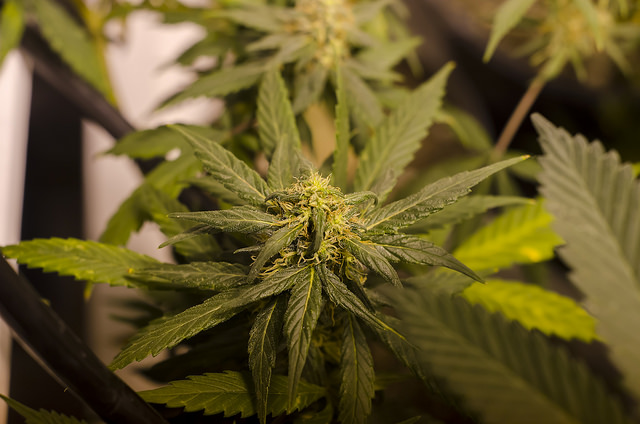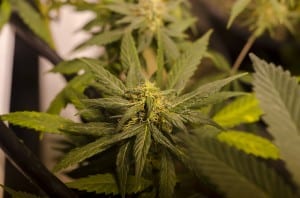Petersburg’s newest committee is tackling the thorny issues around regulating the production, sales and use of marijuana in the community. The large new group met for the first time Wednesday and split up into subcommittees.
Audio Player
The 19-person committee includes three borough assembly members, and representatives from the police department and school district. It’s tasked with making recommendations to the borough assembly on ordinances for regulating pot use and businesses on a local level. Assembly member Jeigh Stanton Gregor is chairing the group and proposed a more relaxed approach to meetings.
“None of the Roberts Rules of a standard meeting, we can just speak freely,” Stanton Gregor said. “I guess the expectation as adults we won’t be talking over each other and yelling at each other and I guess that’s the role I’ll play as chair to mediate if need be but I don’t think it will come to that.”
Stanton Gregor asked committee members to introduce themselves and talk a little about why they wanted to be a part of the advisory group.
Thomas Kojima said he’s involved in Little League and other youth sports. “Besides Little League a couple of other sports that gets me involved with a lot of parents in town and I get a lot of feedback about what’s going on out there in the community,” Kojima said. “My main concern is make sure it stays in the proper places and not by the schools and our kids. That’s why I wanted to join the board and make sure that was properly done.”
Another committee member Kathy Holtzinger said she had an array of reasons for joining. “Number one there’s a workplace thing that I have to deal with. We will continue drug testing. We will continue having a drug free workout place. But on the other side I voted for marijuana to become legal. Do I want to see dispensaries downtown, no, I don’t wanna see that. We gotta do it the right way. So I have a lot of questions a lot to learn.”
Police chief Kelly Swihart volunteered to be a resource for the committee members. “The typical view of some may be that law enforcement is totally against this but I think that it’s our duty as law enforcement to let the public set the level of tolerance, let the community set the level of tolerance, where they wanna be and how they wanna implement things.”
Others on the committee wanted to make sure last fall’s vote was honored with a majority of voters supporting the legalization and regulation in the state. In the Petersburg Kupreanof precinct the vote last November was 58 percent in favor of legalization.
Mitch Eide was excited to be part of something groundbreaking. “One of the reasons I put my name in is that this is something new, kindof exciting,” he said. “It’s never been done before and I kinda like the idea of being at the ground floor and being able to influence the whole process going ahead, that has some appeal to me.”
Committee members also pointed out that despite the ballot measure becoming the law of the land last month, nothing has yet changed in terms of smoking pot in public or permitted grow operations.
Municipalities have reacted to legalization in different ways – some have acted quickly to clarify their definition of public places, where pot still cannot be smoked without incurring a fine. Others have been looking into a ban on pot businesses, which is an option under the ballot measure. Chuck Rose did not think that was the route to go. “Without legal dispensaries we’re gonna have a thriving black market like we do now,” Rose said. “And it’ll be, marijuana will be more accessible to the people you wanna keep it out of their hands, the kids in school and what have you than if there were legal dispensaries. It’s my opinion.”
Committee chair Staton Gregor asked for a show of hands if anyone wanted to pursue a community ban on pot dispensaries. No one raised a hand. Committee members acknowledged there were people in the community who wanted a pot business ban but agreed such a prohibition would not end black market marijuana sales. “One thing we’ll never be able to do is completely extinguish the black market as Washington and Colorado have seen,” Stanton Gregor said. “That’s just reality. Right now Alaska has a $50 per ounce state tax, already in terms of what you’re mentioning Thomas about undercutting ‘em, It’s gonna be close anyway. And that’ll be an evolutionary process. Right now in Washington that gap is closing. From legalization till now the black market has shrunk because the price gap has shrunk also. Because what it really boils down to is money.”
Other committee members brought up the convenience of purchasing pot from a permitted dispensary instead on the black market. The group even talked about whether it made sense for the borough to run a dispensary, along with permitting private businesses.
The group indentified three main areas and broke up into subcommittees that would research and try to come up with recommendations. One will focus on zoning and where the use, growing and sale of marijuana should be allowed. Another subcommittee will look at public safety including efforts to keep pot out of the hands of people under 21 and security around growing businesses. A third group will look at permitting and taxation – how the borough will permit businesses for growing and retail sales and potential tax revenue options for the municipality.
The subcommittees will be getting together over the next two months and reporting back to the committee at its next meeting May 27th.












